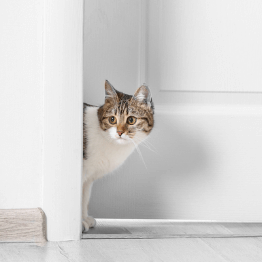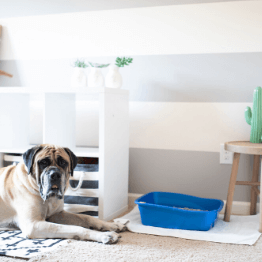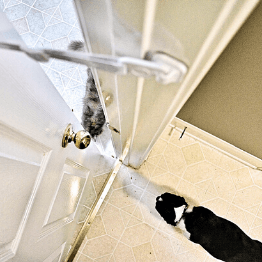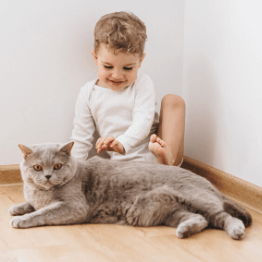WHAT CAUSES DESTRUCTIVE CHEWING IN DOGS?
As much happiness and joy our canine companions provide us, they can also be infuriating at times, and none more so when they enter their destructive chewing modes. Most dog owners will have, at some point, experienced the frustration of returning home to find a favorite pair of shoes destroyed or the corner of the couch chewed within an inch of its life.
But what causes otherwise friendly and happy dogs to exhibit such destructive behavior? And more importantly - what is there to do about it?
WHY DO DOGS CHEW DESTRUCTIVELY?
To solve a problem, you need to know the underlying cause. When it comes to destructive chewing in dogs, you can bet on three main reasons. Fortunately, that means that, more often than not, destructive chewing is something that a dog can be course-corrected.
That’s not to say it won’t take work, of course, and there may well still be the odd time that your dog gets into a ‘chewy’ mood, even once you’ve trained it. However, you can certainly mitigate the most severe of chewing behaviors.
Boredom
Why are dogs destructive when they chew? The first cause of destructive chewing in dogs is boredom. When a dog gets bored, it seeks something to do. If there aren’t any toys lying around, or anybody from whom they can get some easy fuss, their minds will turn to the next easiest thing, chewing.
Boredom causes many problem behaviors in dogs, including barking and pawing for attention, but chewing is possibly the most common. If you have a toddler or young child, you’ll probably notice that when they get bored, they act out, and it’s exactly the same principle when it comes to our canine friends.
Anxiety
Another reason dogs chew destructively is as a means of expressing their anxiety.
For example, if you leave a dog in the house alone, and they suffer from separation anxiety, the dog will most likely turn to chewing. This is a way for dogs to soothe themselves and lessen the anxiety they’re feeling.
Anxiety in dogs is more common than you think. There are a few dos and don'ts of anxious dog training.
Mainly, never scold your dog for being on the nervous side - this will only maximize their fears. Instead, read our blog post here to see how you can help your pooch.
Too Much Energy
The final potential cause for destructive chewing is when a dog has more energy than it knows how to handle. If you live with a particularly active breed like a collie, for instance, and they’re not getting lots of exercise, then this will bubble over and vent out into another activity, like chewing.
Exercise is the best outlet for a dog’s pent-up energy. If your dog isn’t getting appropriate amounts, don’t be surprised if you start seeing a pattern of destructive chewing emerging.
WHAT IS THE MOST DESTRUCTIVE DOG BREED?
There’s no one breed that can be definitively called the most destructive when it comes to chewing, but there are certainly some breeds more prone than others. These include:
Flat-coat Retrievers
Labrador Retrievers
Beagles
Collies
Jack Russell Terriers
If you're wondering why are dogs destructive, the breed is probably not the first thing to look at. Whether you’ve got one of these breeds or not, the root problems are universal. And just because they might naturally be more likely to chew, doesn’t mean that that behavior can’t be avoided. So, how can you stop these chewing behaviors?
HOW TO STOP DOGS FROM DESTRUCTIVE CHEWING?
Stopping Bored Chewing
To stop dogs from destructive chewing, you need to tackle those root causes we mentioned prior.
In the case of boredom, it might be something as simple as choosing the right dog toy for your furry friend.
The key to dog toys is making sure your dog has a variety of different toys, not just one. Because even if your dog has one toy it loves more than any other, they’ll probably still get bored after a while.
As a result, if you’ve not got others in reserve, the chewing option soon becomes attractive again.
Stopping Anxious Chewing
For chewing that stems from anxiety, the key is to work on the nervousness itself. There are some simple tips and tricks to achieve this. First, try and tire them out a bit more - an anxious dog is also one that tends to have lots of energy stored up.
So, before you leave home, make sure you’ve given your dog a run around, or a big walk - this should reduce the chances of anxious chewing. Similarly, put the radio or some music on before leaving, as this ambient background noise can be enough to ease your dog’s mind.
Stopping Exercise-Based Chewing
The solution to this one is as simple as you’d expect: give your dog more exercise! You might think a couple of 30-minute walks each day will suffice for your pup, but that’s not necessarily the case.
Some dogs need to be active most of the time - collies, for example, who are bred to be active all day long. Even if you’re not able to provide that level of exercise, upping the amounts your dog gets will still likely reduce chewing stemming from too much pent-up energy.
Final Thoughts…
Frustrating, yes, unchangeable? No. Destructive chewing can be easily nipped in the bud if you work out what’s causing it, saving both you and your personal possessions a great deal of hassle.







